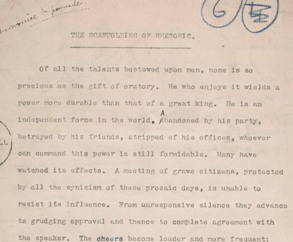



johndoe@gmail.com
Are you sure you want to reset the form?
Your mail has been sent successfully
Are you sure you want to remove the alert?
Your session is about to expire! You will be logged out in
Do you wish to stay logged in?

This collection of documents is based on the exhibition, D-Day: FDR and Churchill’s “Mighty Endeavor” at The Roosevelt Library (May 25, 2019 - January 6, 2020). Consisting of personal correspondence, speeches and secret memoranda, this collection provides an insight into the relationship between Britain and the United States from late 1941, their plans for a joint offensive on the western front and the numerous steps taken in order to execute operation Overlord.
View Highlight
This collection of documents is based on an exhibition which ran from June through to September at the Morgan Library & Museum. It shows how Churchill built and sustained his career by his mastery of the English language: through his many books and newspaper articles, his personal correspondence, his wit, and by the power of his oratory.
View Highlight
Despite many upper-class Britons having a superior attitude towards America in the early twentieth century, Churchill was deeply proud of his American heritage and used his political power throughout his life to encourage a greater relationship between the two countries.
View Highlight
Events in Europe throughout the twentieth century compelled Churchill to retain a strong focus on the Continent during his political career. This extended from the early twentieth century when Churchill fought to reinvigorate Britain’s Navy as a reaction to the rising threat in Germany, to his integral role in the Second World War where he took swift and decisive action to combat Hitler’s armies which were sweeping across Europe.
Nonetheless, it was in the wake of this war that Churchill delivered what were perhaps his most heartfelt and focused speeches on Europe, first in Zurich and later in The Hague. It is these speeches that reveal Churchill’s admiration for and understanding of Europe, and his belief that the only way to rebuild and recover after the devastation of war was through unity and a common purpose.
View Highlight
Winston Churchill is best known for the vital role he played in the Second World War and his involvement in guiding Britain and the Allies to victory over Germany between 1940 and 1945. However, he also played his part in earlier wars.
Churchill’s first experience of war was as a twenty-two year-old, when he fought for Queen and Country in an outpost of the British Empire, on the North-West Frontier bordering Afghanistan. Although he risked life and limb as a young man , it was in the First World War (1914-18) that he perhaps took most risks, both personal and political. This war was to see both his humiliation and fall from grace – and, finally, his redemption.
View Highlight
In the course of a long life, Winston Churchill enjoyed the support and encouragement of three exceptional women, each of whom wielded considerable influence; his nurse Mrs Everest, his mother Lady Randolph Churchill and his wife Clementine.
These documents show how much Churchill owed to the three most important women in his life, and how his views and those of others towards women and their position in society and politics changed over the course of the twentieth century.
View Highlight
This Collection Highlight shows how Churchill evolved as a speaker, from his fairly humble beginnings as an ambitious junior politician to the great orator and war-leader, motivating allies and enemies alike. In 1953, he won the Nobel Prize for Literature for his written and spoken work. The documents highlight how he developed as a speech-maker, the long years of dedication to the art of oratory, and how he used the power of the spoken word to influence the world.
View Highlight